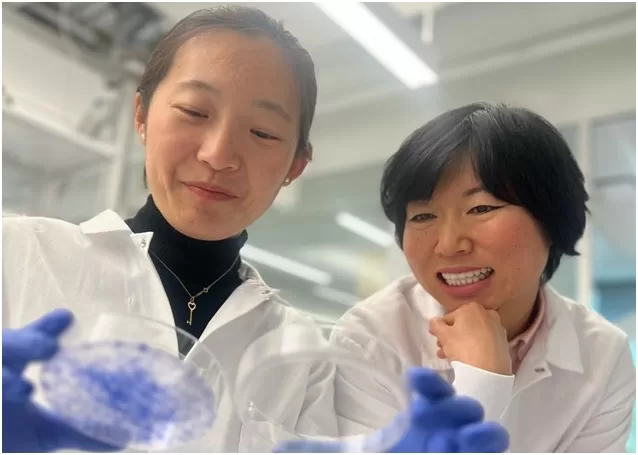Health
Stanford Breakthrough Unveils ENPP1’s Crucial Role in Breast Cancer Battle

Highlights
- Elevated ENPP1 levels in breast tumors linked to a poor prognosis.
- Genetically modified mice resistant to ENPP1’s effects show increased resistance to breast cancer metastasis.
- Breast cancer patients with lower ENPP1 levels respond better to immunotherapy drugs.
- Dr. Lingyin Li’s research journey leads to insights into cGAMP and ENPP1.
- Dr. Li emphasizes ENPP1’s impact on cancer treatment.
- ENPP1’s correlation with immunotherapy response rates indicates its potential as a biomarker.
- Optimism about ENPP1’s therapeutic potential, urging a detailed understanding of cGAMP-STING biology.
- Growing interest in ENPP1 inhibitors among pharmaceutical companies.
- Dr. Li’s research paves the way for innovative cancer therapies, emphasizing the need for a holistic approach in cancer combat.
Stanford Scientists Uncover Breakthrough in Breast Cancer Research
Stanford University researchers, led by Dr. Lingyin Li, have made a groundbreaking discovery in the fight against breast cancer. Their study, published in the Proceedings of the National Academy of Sciences, reveals the pivotal role of Ectonucleotide Pyrophosphatase/Phosphodiesterase 1 (ENPP1) in breast cancer progression.
ENPP1’s Multifaceted Nature
Originally known for its involvement in various biological processes, ENPP1’s significance has expanded to include potential implications in cancer. The enzyme’s ability to degrade certain molecules crucial for activating the immune system against cancer cells is now recognized as a potential contributor to cancer growth facilitation.
Breast Cancer Implications
The Stanford team found that elevated ENPP1 levels in breast tumours are associated with a poor prognosis. ENPP1’s capacity to break down 2′3′-cyclic-GMP-AMP (cGAMP), a crucial molecule for activating the STING pathway, weakens the immune system’s ability to combat cancer cells, potentially contributing to disease progression.
Mouse Model Insights
Intriguingly, genetically modified mice with an ENPP1 version resistant to cGAMP degradation demonstrated increased resistance to breast cancer metastasis. Similarly, breast cancer patients with lower ENPP1 levels responded better to immunotherapy drugs, showing no signs of metastasis for up to seven years. This suggests ENPP1 levels in tumours could predict patient responses to certain cancer treatments.
Dr. Lingyin Li’s Innovative Journey
Dr. Li’s journey, starting at Harvard, led her to investigate cGAMP’s role in activating STING and subsequently identify ENPP1’s significance. Her foundational work paved the way for exploring how inhibiting ENPP1 could enhance the immune system’s fight against cancer.
ENPP1 as an Immune Checkpoint
Dr. Li’s innovative thinking conceptualized cGAMP as an ‘immunotransmitter’ and ENPP1 as an ‘innate immune checkpoint.’ This analogy, sparked during an NIH meeting, underscored the importance of inhibiting ENPP1 to boost the immune system’s effectiveness against cancer.
Biomarker Potential
Highlighting ENPP1’s potential as a biomarker, Dr. Li shared insights from the ISPY-2 trial. The correlation between ENPP1 mRNA levels and immunotherapy response rates suggests a promising avenue for patient stratification in clinical trials.
Future Directions and Therapeutic Potential
Dr. Li remains optimistic about ENPP1’s potential in cancer treatment, emphasizing the need for a detailed mechanistic understanding of cGAMP-STING biology. This holistic approach highlights the importance of integrating biological knowledge with clinical strategies for more effective cancer combat.
Pharmaceutical Interest and Beyond
With growing evidence supporting ENPP1’s role in various cancers, pharmaceutical and biotechnology companies are expected to intensify efforts to explore safe and effective ENPP1 inhibitors. Dr. Li’s work has sparked interest, with companies delving into research for potential inhibitors.
Dr. Lingyin Li’s research on ENPP1 opens new avenues in cancer immunotherapy. By unraveling the molecular mechanisms enabling cancer cells to evade the immune system, her work holds promise for innovative cancer therapies. The pharmaceutical industry’s engagement in searching for ENPP1 inhibitors signals the potential impact of this breakthrough in the ongoing fight against cancer.




















































